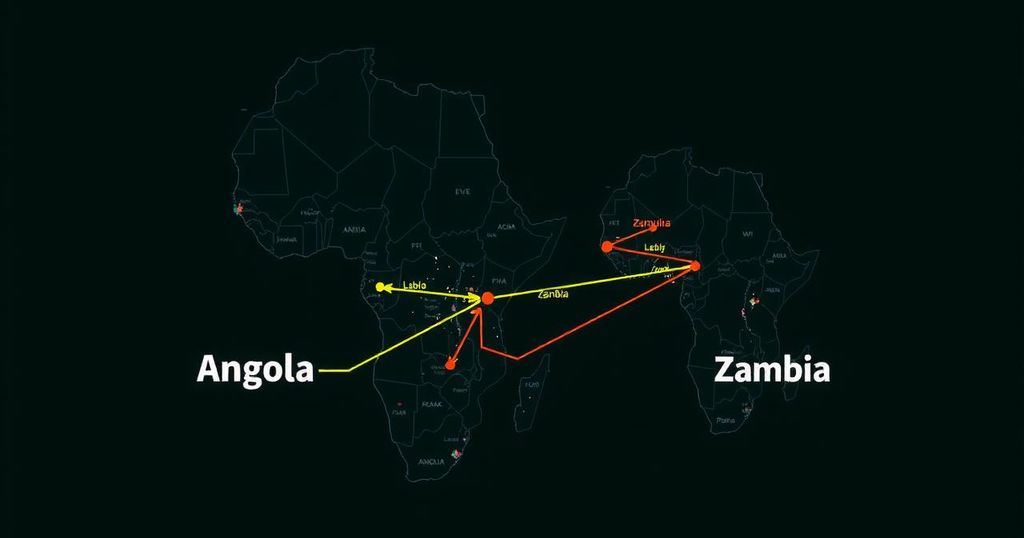AFC Finalizes Agreements with Angola and Zambia to Advance Zambia Lobito Rail Project
The Africa Finance Corporation has signed agreements with Angola and Zambia to develop the Zambia Lobito Rail Project. This rail corridor is set to enhance trade logistics for Zambia and the DRC, linking key agricultural and mining regions to the Port of Lobito, promoting economic growth and job creation while achieving environmental sustainability.
The Africa Finance Corporation (AFC) has finalized concession agreements with Angola and Zambia to facilitate the financing, construction, ownership, and operation of the Zambia Lobito Rail Project. This initiative establishes a critical alternative transport route for Zambia and the Democratic Republic of Congo (DRC), enabling efficient access to international markets. The Lobito corridor will significantly shorten the transportation route for exports and imports by connecting vital mining sectors and agricultural businesses in Zambia and the DRC directly to the Port of Lobito. This development is poised to simplify cargo movement from Zambia’s Copperbelt and Northwestern Provinces through Angola, reaching Western markets seamlessly. The agreements were ceremoniously signed on September 24, 2023, in a ceremony presided over by U.S. Secretary of State Antony J. Blinken, organized in conjunction with the Biden Administration’s G-7 Partnership for Global Infrastructure and Investment (PGI) during the 79th UN General Assembly. Previously, the AFC was appointed lead developer for the rail project, collaborating with multiple stakeholders, including the U.S. Government, the European Union, the African Development Bank, and the governments of Angola, the DRC, and Zambia. The Lobito Rail Project encompasses the establishment of an approximately 800-km greenfield rail line that will connect the Benguela rail line in Luacano, Angola, with the existing Zambia Railways Line in Chingola, Zambia. Upon completion, this trade corridor will facilitate efficient cargo transportation while fostering investments across various sectors, including agriculture, health care, digital infrastructure, mining, and electricity supply along its route. In conjunction with the concession agreements, the AFC has secured a significant $2 million grant from the United States Trade and Development Agency (USTDA). This funding will aid in completing essential environmental and social studies, ensuring that the project complies with international standards and best practices for environmental management. The AFC emphasized its pivotal role in leading the development of the rail project, which not only enhances the transportation of minerals and metals from the region but also establishes a vital trade corridor across Africa, linking the Port of Lobito on the Atlantic Ocean to the Port of Dar es Salaam in Tanzania on the Indian Ocean, thus facilitating intra-African and global trade.
The Zambia Lobito Rail Project is a strategic infrastructure development aimed at enhancing trade and logistics between key African nations, specifically Zambia and Angola. The region has traditionally faced challenges due to inadequate transport routes, which hinder economic growth potential. By constructing a dedicated rail line, the project seeks to connect landlocked nations like Zambia to crucial export markets via accessible coastal ports. This initiative not only promises to improve the movement of goods but is also expected to bring substantial economic benefits, job creation, and environmental sustainability to the participating countries.
In summary, the Zambia Lobito Rail Project, championed by the Africa Finance Corporation, represents a transformative development for both Angola and Zambia. The strategic corridor promises to enhance connectivity to critical markets, support economic growth, and create job opportunities while adhering to rigorous environmental standards. The collaborative effort among various stakeholders reflects a significant step toward modernizing infrastructure and facilitating regional trade. The project’s anticipated socio-economic benefits underline its importance in the broader context of African integration and development.
Original Source: www.esi-africa.com




Post Comment